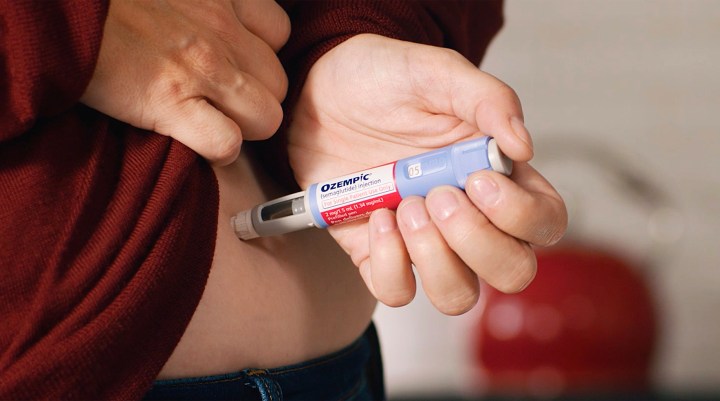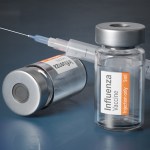BHEKISISA CENTRE FOR HEALTH JOURNALISM
Global stocks of diabetes drug Ozempic drained by doctors prescribing it for weight loss

Medicine shortages are common. But what happens when an effective medication runs short because people who the medicine isn’t intended for are depleting its stocks?
People with type 2 diabetes in South Africa have been left without one of their most effective — and cheaper — treatments because doctors are now also widely prescribing it as a weight-loss drug.
The medicine, Ozempic, is given as a weekly injection. The potentially life-saving drug can help people with type 2 diabetes — a condition that leads to almost as many people dying in South Africa as tuberculosis, the number one killer in the country.
There has been a shortage of the medication for about six months. Danish pharmaceutical company, Novo Nordisk, told activists the drug should be fully restocked this month.
People with type 2 diabetes have excessive sugar in their blood because their bodies don’t make enough insulin. Insulin lowers blood sugar levels because the hormone tells the body’s cells to take up glucose (a type of sugar) and use it for energy.
If type 2 diabetes isn’t treated, it can cause blindness or lead to heart problems. Because untreated high blood sugar causes damage to nerves in the body and blocks blood flow by narrowing the blood vessels, it can result in limbs, including feet, having to be amputated.
Ozempic, which is made by Novo Nordisk, lowers the blood sugar of people with type 2 diabetes by causing the pancreas to release extra insulin when the person eats.
But it has another effect too: it helps to make you feel full for longer after meals, which reduces the desire to eat.
The medicine comes in a 1.5ml injection pen costing between R1,200 and R1,500. Depending on how much help a patient needs to control their blood sugar, a weekly dose of between 0.25mg and 2mg is prescribed. Each millilitre in the tube contains 1.34mg of the drug, so one pen can last between one and eight weeks.
In South Africa, Ozempic is registered to treat type 2 diabetes only.
But doctors also have the power to prescribe the medicine “off-label” — for reasons other than indicated on the package insert, which, in this case, is to help heavily overweight or obese people lose weight.
Someone is considered heavily overweight when their body mass index is 25 or higher, and obese when this number reaches 30 or more.
Ozempic is registered as a schedule 4 drug and can only be given by a doctor or a prescribing nurse.
Tauhierah Tavares, 48, was diagnosed with type 2 diabetes in 2020. She has been using Ozempic to keep her blood sugar under control.
“I understand medicine shortages because I work in a hospital, but when I found out it was out of stock because people were using it for weight loss, I found that unfair,” she says.
“I need it for my health.”
Is Ozempic a miracle cure?
The trend to use Ozempic for weight loss took off on social media in 2022 — not only in South Africa, but around the world.
#Ozempic, for instance, has 300 million views on TikTok (South Africa’s fastest-growing social media platform for access to news).
The “unexpected demand” drained stock globally in May 2022, Novo Nordisk told Australia’s medicines regulator.
Stocks in South Africa dried up three months later, from around August.
At first, people with diabetes could switch to an alternative called Trulicity, which is also taken as a weekly injection and works like Ozempic. But then Trulicity’s manufacturer, the American-based pharma company Eli Lilly, announced their stocks were also running low, for reasons “closely related to the shortage of Ozempic’”.
The medicine will only be fully restocked from 31 March, the producers say.
Ozempic is part of a group of medicines called GLP-1 receptor agonists. These drugs appear to the body to resemble a hormone called glucagon-like peptide 1 (GLP-1) that is released in the gut. This hormone prods the body to not only release insulin when food is ingested, but also slows the transfer of the stomach’s content to the small intestine. In this way, a person feels full for longer and thus appetite is kept in check.
One Ozempic pen, which could be enough for eight weeks’ supply, is at least R500 cheaper than an injection filled with either of two other drugs that can be used to control blood sugar. But because these alternatives have to be taken daily, instead of once a week like Ozempic, one pen would be enough to last only about two weeks. Moreover, research shows the type of drug in Ozempic is longer acting and works better for weight loss than the other options on the market.
Prescribing medicines for people hoping to lose weight is part of a change in the way doctors approach the issue.
Research shows that many obese or heavily overweight people aren’t able to lose weight (and keep it off) by exercising and restricting what they eat, because of their genes or through being unable to buy healthy food easily (rather than simply not having enough self-discipline to make good food choices).
In people who have a body mass index of over 35, some of the best solutions that keep the weight off for a few years, studies show, are bariatric surgery (an operation that makes your stomach smaller and so helps you to eat less) or appetite-suppressing medicines such as Ozempic.
When researchers analysed the findings of 20 studies that investigated how well people could keep the weight off which they had lost after following a very low-energy diet for up to 16 weeks, they found that after a year and a half, people who used anti-obesity drugs fared better than those who exercised only or used dietary supplements.
The science behind using medicine to help people lose weight is now so acknowledged that the American Academy of Paediatrics published first-of-its-kind guidelines in January to treat obesity in children and teenagers this way.
In South Africa, about one in eight children between the ages of five and nine, and one in five children aged 10-14, are obese. This is according to a report on overnutrition from the Children’s Institute at the University of Cape Town (UCT).
But Joel Dave, head of the division of endocrinology at UCT, cautions that Ozempic only works while you take it and “doesn’t address the underlying reasons for weight gain — so people need to take it lifelong, if they want to maintain their weight loss”.
Are doctors allowed to prescribe drugs off-label?
Prescribing a medicine off-label is not illegal in South Africa, but there are rules around it.
The Medicines and Related Substances Act says medicines must be registered for a specific use. In the case of Ozempic, this is for helping people with type 2 diabetes control their blood sugar level. Using it to treat any other condition would be risky, as the South African Health Products Regulatory Authority (Sahpra) would not have reviewed how it works in such cases.
When prescribing a medicine off-label, doctors have to decide whether it’s the best option for their patient.
Because the Consumer Protection Act also applies to medicines, prescribers must get a patient’s consent for offering an off-label treatment, since a consumer has the right to receive goods that are “reasonably suitable for the purposes for which they are intended”.
In the case of medicines, this would be the one indicated in the package insert. Under this law, the health professional must also warn the patient about any dangers of using the medicine in this way. However, this is not really possible without enough data on its alternative use.
What is being done to increase stock?
Tobeka Boltina, head of the clinical, medical and regulatory affairs department of Novo Nordisk South Africa, says they are aware of how serious the situation is and that they are “working closely with authorities” to avoid upsetting patients’ treatment.
She adds that the company is looking into registering Wegovy, a product similar to Ozempic but used specifically for weight loss, in South Africa. Because Wegovy is meant as a weight-loss medicine, this could take pressure off the demand for Ozempic.
Sahpra says it has not yet received such an application.
Elsewhere, for example in Australia, authorities have approved products similar to Ozempic which have been registered in other countries for use, to prevent people from having to go without their medicine.
This is the equivalent of prescribers in South Africa making use of a Section 21 application to import a medicine. However, these products could be more expensive and are only approved if there are no other drugs available in the country, or if the other options haven’t worked.
South Africa has several alternative treatments for lowering diabetes patients’ blood sugar and patients should consult their healthcare professionals on which alternative is best for them. DM/MC
This story was produced by the Bhekisisa Centre for Health Journalism. Sign up for the newsletter.


















Comments - Please login in order to comment.